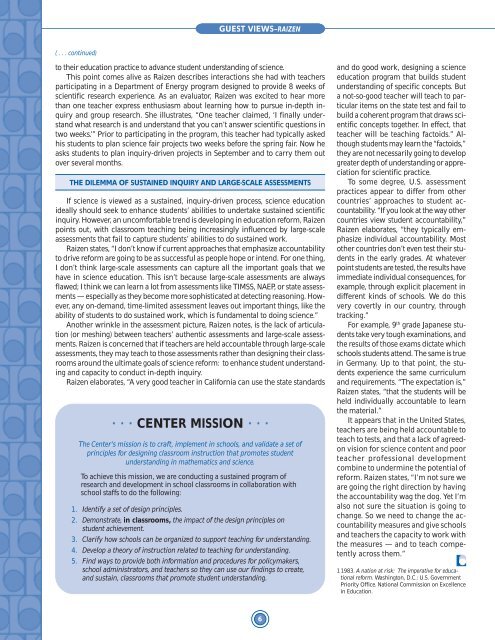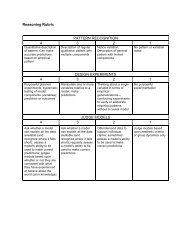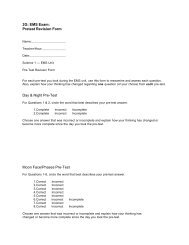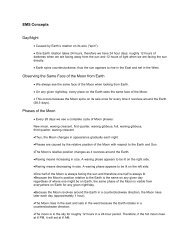Science Education Reform - National Center for Improving Student ...
Science Education Reform - National Center for Improving Student ...
Science Education Reform - National Center for Improving Student ...
Create successful ePaper yourself
Turn your PDF publications into a flip-book with our unique Google optimized e-Paper software.
GUEST VIEWS–RAIZEN<br />
( . . . continued)<br />
to their education practice to advance student understanding of science.<br />
This point comes alive as Raizen describes interactions she had with teachers<br />
participating in a Department of Energy program designed to provide 8 weeks of<br />
scientific research experience. As an evaluator, Raizen was excited to hear more<br />
than one teacher express enthusiasm about learning how to pursue in-depth inquiry<br />
and group research. She illustrates, “One teacher claimed, ‘I finally understand<br />
what research is and understand that you can’t answer scientific questions in<br />
two weeks.’” Prior to participating in the program, this teacher had typically asked<br />
his students to plan science fair projects two weeks be<strong>for</strong>e the spring fair. Now he<br />
asks students to plan inquiry-driven projects in September and to carry them out<br />
over several months.<br />
THE DILEMMA OF SUSTAINED INQUIRY AND LARGE-SCALE ASSESSMENTS<br />
If science is viewed as a sustained, inquiry-driven process, science education<br />
ideally should seek to enhance students’ abilities to undertake sustained scientific<br />
inquiry. However, an uncom<strong>for</strong>table trend is developing in education re<strong>for</strong>m, Raizen<br />
points out, with classroom teaching being increasingly influenced by large-scale<br />
assessments that fail to capture students’ abilities to do sustained work.<br />
Raizen states, “I don’t know if current approaches that emphasize accountability<br />
to drive re<strong>for</strong>m are going to be as successful as people hope or intend. For one thing,<br />
I don’t think large-scale assessments can capture all the important goals that we<br />
have in science education. This isn’t because large-scale assessments are always<br />
flawed; I think we can learn a lot from assessments like TIMSS, NAEP, or state assessments<br />
— especially as they become more sophisticated at detecting reasoning. However,<br />
any on-demand, time-limited assessment leaves out important things, like the<br />
ability of students to do sustained work, which is fundamental to doing science.”<br />
Another wrinkle in the assessment picture, Raizen notes, is the lack of articulation<br />
(or meshing) between teachers’ authentic assessments and large-scale assessments.<br />
Raizen is concerned that if teachers are held accountable through large-scale<br />
assessments, they may teach to those assessments rather than designing their classrooms<br />
around the ultimate goals of science re<strong>for</strong>m: to enhance student understanding<br />
and capacity to conduct in-depth inquiry.<br />
Raizen elaborates, “A very good teacher in Cali<strong>for</strong>nia can use the state standards<br />
• • • CENTER MISSION • • •<br />
The <strong>Center</strong>’s mission is to craft, implement in schools, and validate a set of<br />
principles <strong>for</strong> designing classroom instruction that promotes student<br />
understanding in mathematics and science.<br />
To achieve this mission, we are conducting a sustained program of<br />
research and development in school classrooms in collaboration with<br />
school staffs to do the following:<br />
1. Identify a set of design principles.<br />
2. Demonstrate, in classrooms, the impact of the design principles on<br />
student achievement.<br />
3. Clarify how schools can be organized to support teaching <strong>for</strong> understanding.<br />
4. Develop a theory of instruction related to teaching <strong>for</strong> understanding.<br />
5. Find ways to provide both in<strong>for</strong>mation and procedures <strong>for</strong> policymakers,<br />
school administrators, and teachers so they can use our findings to create,<br />
and sustain, classrooms that promote student understanding.<br />
and do good work, designing a science<br />
education program that builds student<br />
understanding of specific concepts. But<br />
a not-so-good teacher will teach to particular<br />
items on the state test and fail to<br />
build a coherent program that draws scientific<br />
concepts together. In effect, that<br />
teacher will be teaching factoids.” Although<br />
students may learn the “factoids,”<br />
they are not necessarily going to develop<br />
greater depth of understanding or appreciation<br />
<strong>for</strong> scientific practice.<br />
To some degree, U.S. assessment<br />
practices appear to differ from other<br />
countries’ approaches to student accountability.<br />
“If you look at the way other<br />
countries view student accountability,”<br />
Raizen elaborates, “they typically emphasize<br />
individual accountability. Most<br />
other countries don’t even test their students<br />
in the early grades. At whatever<br />
point students are tested, the results have<br />
immediate individual consequences, <strong>for</strong><br />
example, through explicit placement in<br />
different kinds of schools. We do this<br />
very covertly in our country, through<br />
tracking.”<br />
For example, 9 th grade Japanese students<br />
take very tough examinations, and<br />
the results of those exams dictate which<br />
schools students attend. The same is true<br />
in Germany. Up to that point, the students<br />
experience the same curriculum<br />
and requirements. “The expectation is,”<br />
Raizen states, “that the students will be<br />
held individually accountable to learn<br />
the material.”<br />
It appears that in the United States,<br />
teachers are being held accountable to<br />
teach to tests, and that a lack of agreedon<br />
vision <strong>for</strong> science content and poor<br />
teacher professional development<br />
combine to undermine the potential of<br />
re<strong>for</strong>m. Raizen states, “I’m not sure we<br />
are going the right direction by having<br />
the accountability wag the dog. Yet I’m<br />
also not sure the situation is going to<br />
change. So we need to change the accountability<br />
measures and give schools<br />
and teachers the capacity to work with<br />
the measures — and to teach competently<br />
across them.”<br />
1 1983. A nation at risk: The imperative <strong>for</strong> educational<br />
re<strong>for</strong>m. Washington, D.C.: U.S. Government<br />
Priority Office. <strong>National</strong> Commission on Excellence<br />
in <strong>Education</strong>.<br />
6





